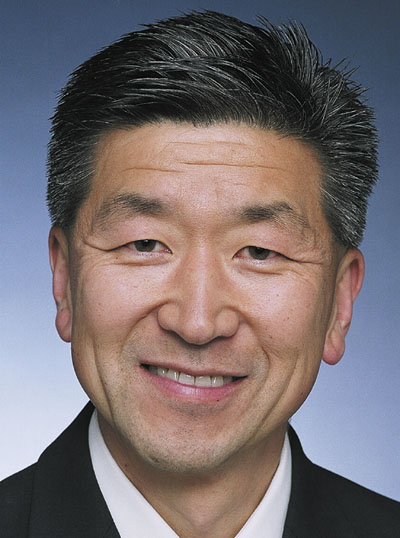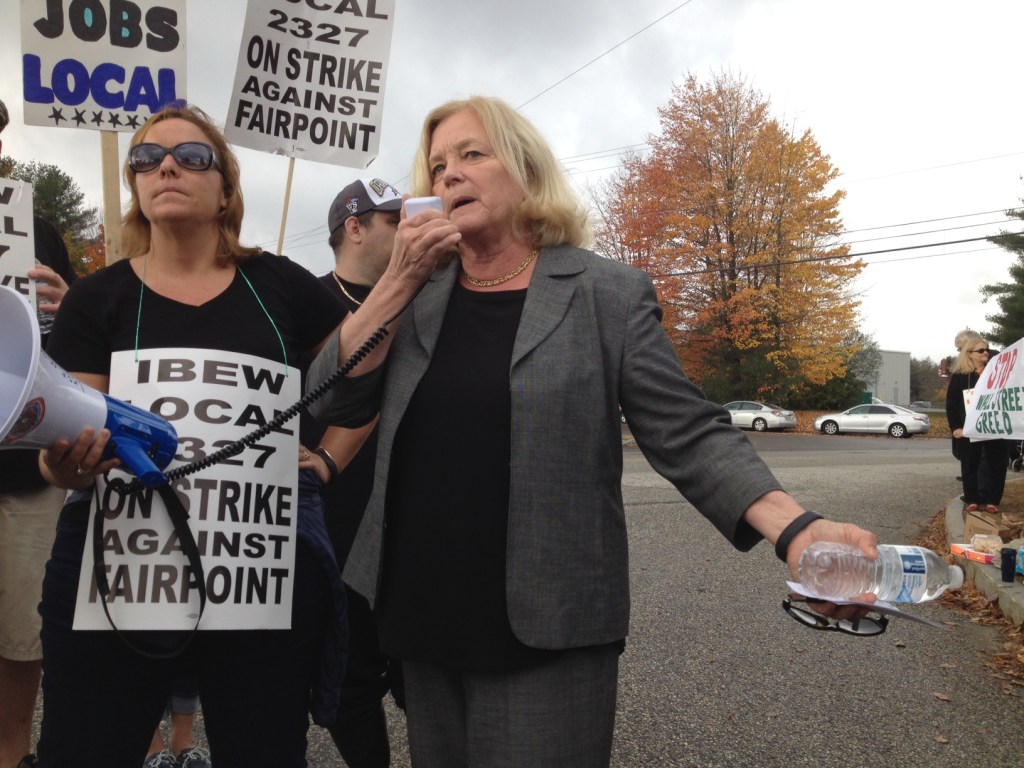As the FairPoint Communications strike extends into its third month, U.S. Rep. Chellie Pingree of Maine says she has had enough.
Pingree sent a letter Friday afternoon to FairPoint CEO Paul Sunu, expressing her concern about the strike dragging on since Oct. 17, and about the impact it’s having on the company’s roughly 800 striking employees in Maine.
The letter also implies that the company’s contracts with the government could be at stake.
“The ongoing strike and what seems like an unwillingness to compromise on the part of the company is bad for the workers and their families, bad for the telecommunications systems in New England and bad for our region’s economy,” she wrote. “The company’s insufficient response to these contract negotiations causes me to question whether taxpayer dollars are being wisely spent on government contracts with FairPoint.”
FairPoint received $1.5 million from contracts with the federal government in the last four years, according to USASpending.gov, an official website of the federal government. The company has much more lucrative contracts with the states in which it operates. In Maine, for example, FairPoint received a $32 million contract in early 2013 to build the state’s next-generation 911 emergency communications system.
Angelynne Beaudry, a spokeswoman for FairPoint, was not prepared to comment on Friday. “When Paul Sunu receives the letter, we will respond,” she said.
CEO Sunu’s position is not a mystery. He responded this week to similar letters from Vermont Gov. Peter Shumlin and that state’s congressional delegation urging FairPoint to settle the strike. Those letters were a response, in part, to a FairPoint equipment failure that led to a nearly six-hour disruption to Vermont’s 911 emergency communications network, which FairPoint maintains.
The letter from the Vermont delegation, like Pingree’s, raises the prospect of reconsidering a $10 million contract for FairPoint to maintain Vermont’s next-generation 911 system for the next five years.
Sunu made it clear in his response to the Vermont letters that the company will not budge in its position with the unions.
“The unions walked off the job because they want to preserve wages and benefits that are inconsistent with today’s competitive telecommunications landscape,” Sunu wrote to the Vermont delegation. “The reality is that FairPoint cannot give in to the demands of our striking unions. The benefits they demand are a barrier to the telecommunications services Vermonters and Vermont’s economy deserve now and in the future.”
Maine Gov. Paul LePage has no plans to take a public position on the FairPoint strike, said Adrienne Bennett, his press secretary. She said LePage met with FairPoint officials in late October to seek assurances that the state’s 911 system, which received 670,000 calls in 2013, will not be impaired by the strike.
“As governor, he has not taken sides and will not take sides in any ongoing labor dispute,” Bennett said Friday. “However, he will take appropriate action if and when necessary because public safety is our top priority. The (Public Utilities Commission), the Office of the Public Advocate and the governor’s office will continue to monitor this situation throughout its duration to ensure the safety of Maine’s citizens and that critical telecommunication systems remain operational.”
Among Maine’s congressional delegation, Pingree, a Democrat who represents the 1st District, is ahead of her colleagues in taking a position in the labor dispute. She visited striking FairPoint workers on a picket line in Portland in late October.
U.S. Sen. Angus King, an independent, has not taken a position on the strike, but “is frustrated by the slow-moving contract negotiations between FairPoint Communications and its employees and is concerned about the impact the strike is having on communications in Maine and FairPoint’s employees and customers,” his spokesman, Scott Ogden, said Friday.
“The National Labor Relations Board is currently considering whether FairPoint acted properly when it declared an ‘impasse’ in negotiations. And Senator King supports allowing the NLRB to make this decision,” Ogden said in an email. “This is a tough time of year for anyone to face uncertainty – particularly for those families who have been impacted by this strike for over three months. Senator King will continue to closely monitor the situation and believes all parties involved would benefit from reaching an agreement as soon as possible.”
Republican U.S. Sen. Susan Collins “believes it is very unfortunate that this dispute has persisted for so long, hurting FairPoint’s employees and customers,” Kevin Kelley, the senator’s spokesman, said Friday. “It is particularly difficult for the employees to be out of work during the holidays. It is her hope that both parties will work together in good faith to bring a quick resolution to this matter.”
About 800 unionized FairPoint employees in Maine walked off the job at midnight on Oct. 16, claiming the company had failed to negotiate in good faith since contract deliberations began in April. Those contract talks fell apart in late August, when FairPoint’s representatives walked away from the negotiating table, claiming the parties had reached an “impasse” – a term in labor law that allows the company to impose the conditions of its final contract offer on its employees.
Maine’s striking workers are among more than 1,900 FairPoint employees in Maine, New Hampshire and Vermont who are on strike and represented by the International Brotherhood of Electrical Workers and the Communication Workers of America.
Since the beginning of August, the unions have filed six complaints with the NLRB accusing the company of unfair labor practices. Two were initially rejected and are under appeal. The other four, two of which are identical and concern the company’s declaration of an “impasse” in negotiations, are pending.
FairPoint has offered landline telephone and Internet service to customers in Maine, New Hampshire and Vermont since 2008, when it bought Verizon’s landline business in northern New England for $2.3 billion. It has struggled financially ever since, filing for Chapter 11 bankruptcy in 2009 and emerging two years later.
Pingree is married to S. Donald Sussman, majority owner of MaineToday Media, which publishes the Portland Press Herald/Maine Sunday Telegram, the Kennebec Journal in Augusta and the Morning Sentinel in Waterville.
Send questions/comments to the editors.



